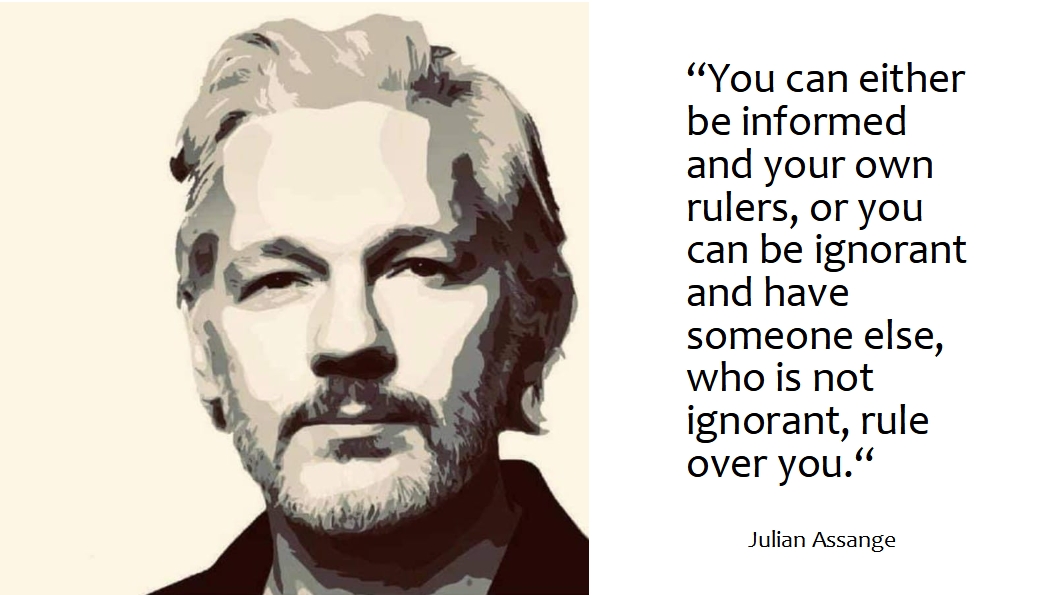
What about Julian Assange? For this first chapter of our deep dive into “A society of fear”, that is a good starting point. Perhaps you’ve read the message I posted on his birthday. It explained a bit about the influence Julian had and still has in regards to building a new kind of independent press and how the establishment responded to it. It’s time to look into why platforms like Wikileaks are so much more effective than regular press outlets in disseminating the truth. What exactly makes it “special”. Why did Julian Assange and Wikileaks become a target?
Right now I’m still busy writing a piece about different methods of propaganda. But this specific article will focus on the “fear” appeal, part of the “special appeals” method in propaganda (More about the different methods can be found at the PBS classroom materials).
First some history.
Wikileaks.org was registered on the 4th of October 2006 and the website published its first document two months later. Wikileaks is usually represented in public by Julian Assange, described by some as “the heart and soul of the organisation, its founder, philosopher, spokesperson, original coder, organizer, financier, and all the rest”. Daniel Domscheit-Berg, Kristinn Hrafnsson, Sarah Harrison and Joseph Farrell are other publicly known associates and former associates of Julian Assange, involved with the website.
Wikileaks was established with a “Wiki” communal publication method, which was terminated in May 2010. The original founders and volunteers were a mixture of dissidents, journalists, mathematicians and other activists and technologists from Australia, Europe, South Africa, Taiwan and the United States. In June 2009 the website had over 1200 registered volunteers. In a 2013 resolution the International Federation of Journalists called Wikileaks a “new breed of media organisation” that “offers important opportunities for media organisations”. Harvard professor Yochai Benkler praised Wikileaks as a new form of journalistic enterprise. He testified at the court martial of Chelsea Manning, stating that “Wikileaks serves a particular journalistic function,” and that the “range of the journalist’s privilege is a hard line to draw”.
According to the Wikileaks website, its goal is to bring important news and information to the public. “One of our most important activities is to publish original source material alongside our news stories so readers and historians alike can see evidence of the truth.” Another goal is to ensure that journalists and whistleblowers are not prosecuted for emailing sensitive or classified documents. The online “drop box” is described by Wikileaks as “an innovative, secure and anonymous way for sources to leak information to Wikileaks journalists”. On 26 September 2018 it was announced that Julian Assange had appointed Kristinn Hrafnsson as editor-in-chief of Wikileaks while Assange remained as its publisher.
In 2010, current United States president Joe Biden compared Julian Assange to a high tech terrorist. In that same year, Interpol, an organization that is comprised of 96 countries including Russia and the United States, issued an official arrest warrant against the journalist.
The president of the United States made the following statements:
“I would argue it’s closer to being a high tech terrorist than the Pentagon Papers.”
“This guy has done things that have damaged and put in jeopardy the lives and occupations of people in other parts of the world.”
Famous United States politician Hillary Clinton wrote:
“He’s a tool of Russian intelligence, and if he’s such a … martyr of free speech, why doesn’t WikiLeaks ever publish anything coming out of Russia?”
“He claims to be a champion of transparency, but for many years, he’s been helpful to Putin, one of the most repressive and least transparent autocrats in the world.”
This happened around the United States elections, where the so called “Russian scare” was being used, and claims were made that Russia attempted to hack the elections. Of course none of these statements about Julian Assange have got anything to do with the truth. WikiLeaks cables openly characterized Russia as a “mafia state,” and named Russian President Dmitry Medvedev the “Robin to Putin’s Batman” then said Russian intelligence “masterminded” a shadow war in Georgia. Not exactly the most flattering publications at all. Julian Assange and Wikileaks never denied the horrible situation in Russia. When speaking out about an authoritarian regime, one does not have to support another authoritarian regime.
Read more:
http://marklubbers.com/a-society-of-fear-the-case-of-julian-assange-deep-dive/
The title reminded me of this video I watched recently, so good